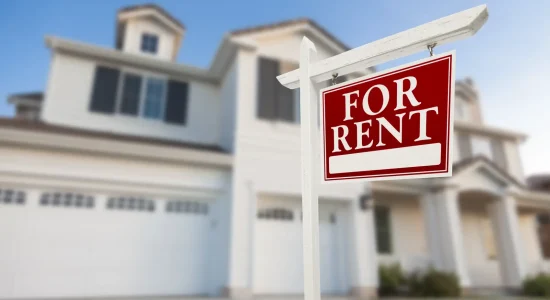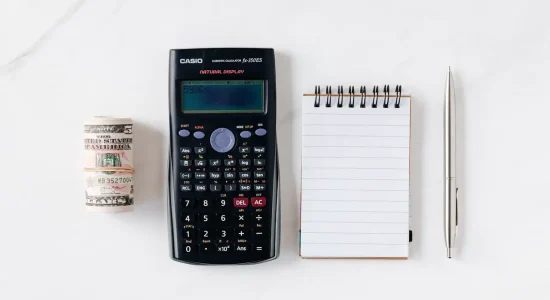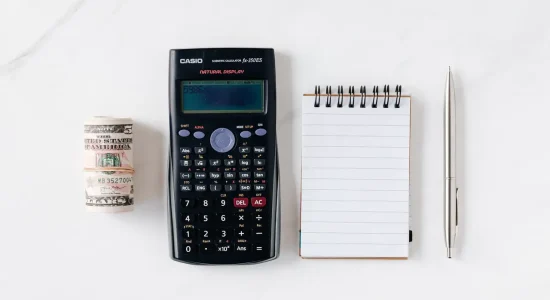If you rent, you know that money can quickly add up. But there are some expenses when renting that are often overlooked.
When you rent something, whether it’s an office, a car, or a home, you incur a monthly expense. This expense is known as rent expense. When you are renting, you will need to consider rent expenses. These include rent; utilities; insurance; repairs; property taxes; and other payments. Make sure that you are including these in your budget.
With an ever-changing real estate landscape, individuals looking for new apartments are regularly torn between renting or buying. In 2021, 77% of the population preferred renting a home instead of buying it.
Now that you have a general idea about some of the added expenses of renting, I’m going to tell you what they are and how much they can cost you if you’re not careful.
20 Expense Traps of Renting (Types and Costs)
Here are 20 expense traps you should be aware of and try your best to avoid, especially as a first-time renter.
#1 Application Fees

Type: Mandatory
Cost: $15-$50 per person
The first step when applying for an apartment is filling out an application for that particular apartment or home. The application forms can vary in length and cost depending on the property.
Another factor to consider is that the landlord may require every individual in the tenant’s party to fill out that form, increasing the total cost of the application fees.
Application fees are usually paid upfront when applying, but I have seen some landlords adjust the application fees into the first month’s rent.
So if you’re tight on cash, make sure to inquire if this is a viable option.
#2 Security Deposits

Type: Mandatory
Cost: One or two months of rent depending upon the real estate
If you have been accepted as a tenant by the landlord, you will be asked to submit a security deposit.
Security deposits are legal money deposits that can be used to pay for any damages done by the tenant. They are in place to protect the landlord and stop the tenants from breaking any clause in the lease.
The security deposit for apartments is much lower in comparison to security deposits for houses.
Please note that security deposits are separate payments and are not included with down payments.
#3 Advance Payments

Type: Mandatory
Cost: One or two months of rent as per landlord’s requirements
Another big payment that has to be done before you’re finally in control of the apartment is the down payment, also known as advance payment.
Finding the right tenant and reaching a deal satisfying both parties is a hectic job.
That is why landlords prefer to take down payments to ensure tenants would stay there for a suitable amount of time.
Advance payments are the highest upfront payments for renting.
Once the down payment is paid, the tenants have control over the apartment for a minimum of however many months of rent was paid in advance.
» Read my blog post about: Is Earning Money Online Possible?
#4 Rent Inflation

Type: Mandatory
Cost: 5% — 10% annually
Inflation is a constant dilemma affecting every aspect of our lives. But in terms of rent, a few percent can make drastic changes.
Some rental leases have clauses that state the rent will increase annually by a fixed percent.
Tenants can estimate their rent for the following years, given that landlords stick to the agreement and no amendments are made.
Always look out for rent inflation clauses as they will safeguard you in the future. Without legally binding clauses, landlords can increase the rent on a whim. This expense when renting is crucial to look out for.
#5 Utility Charges

Type: Mandatory
Cost: $$250 — $400 per month
This is the first recurring expense you’ll be charged monthly when renting.
It depends majorly on the number of people living in an apartment and their usage of basic utilities such as:
- Water
- Electricity
- Gas
Your utility bills are also affected by the size of your apartment and how many appliances are present as some appliances need to run 24/7, e.g., refrigerators.
Utility charges are highly variable, and it is difficult to provide a rough estimate as they vary even from state to state.
» Read my blog post: How Much Is a 7 & 8 Figure Salary
#6 Luxury Fees

Type: Optional
Cost: $31.00-$44.20 per month (gym memberships), $100-$300 per month (swimming pool)
The luxury fees are charges not applicable to every apartment. These are only considered expenses when renting large, luxurious apartments or homes with built-in swimming pools or hot tubs.
The maintenance of these amenities requires the tenants to pay extra to use them.
The luxury fees are optional at times such that some landlords allow you to opt-out of it if you are not using those facilities.
This is something I recommend you should clear with your landlord before you rent out their apartment. It should be noted these are highly variable.
#7 Pest Control/Maintenance

Type: Mandatory
Cost: $140 — $8,000
This is an on-demand payment that many may not have to face in their renting tenure. Pests are often more of an issue in houses as compared to apartments.
If you’re facing issues with one such as rats in the wall or moles in your garden, you will have to pay an exterminator to come and take care of it.
This is usually an expense while renting small houses, especially those in the suburbs. Apartments or large houses, such as those in the city, rarely come across these issues.
Pest control costs depend on the type of pest and the magnitude of the infestation.
#8 Appliance Costs

Type: Mandatory
Cost: $600 — $30,000 (oven), $3,810 — $7,480 (air-conditioning unit)
Apartments come in both furnished and un-furnished forms. Un-furnished apartments are cheaper, but you’ll have an added expense of buying appliances.
Now, if you don’t need anything fancy or too high-end, I’d recommend buying your own, as many landlords fit in expensive appliances to chuck up the rent.
Notable appliances to buy:
- Dishwashers
- Refrigerators
- Vacuums
- Heating & Cooling Equipment
- Kitchen Appliances
To avoid unnecessarily getting caught in appliance costs, make sure to visit and properly view the entire apartment before making any decisions.
#9 Parking Charges

Type: Mandatory
Cost: $150 — $450 per month
If you’re buying an apartment, one of the first things you’ll notice is if their parking can house your car.
Car parking can be a major issue for many tenants as walking long distances for trivial tasks can be hectic. But if you’re given proper parking, that is another expense when renting.
Most apartments have separate floors for car parks and will charge you accordingly.
They may even provide a valet service, depending on the apartment management.
» This could also be something for you: 15 Examples of Businesses That Run Themselves
#10 Cable/ Internet Service Charges

Type: Mandatory
Cost: $60 per month (Internet), $60 — $100 per month (Streaming Service)
Cable and internet charges are other recurring charges that depend on the packages you opt for.
If you’re leaning towards better internet packages that provide higher speeds and smooth connections, you’ll be paying more out of your pocket.
On the other hand, cheaper services may cost less but result in lower reliability and broken connections.
Before localizing an area, I’d recommend searching up what services are provided in that area and if they meet your requirements.
#11 Moving Costs

Type: Mandatory
Cost: $800-$2,500 for a 2-person moving team within a 100-mile radius, $2,200-$5,700 for long distances and a bigger moving team
This is a one-time charge that won’t cost you much but is necessary to finish moving.
When you empty your old residence and want to move into your new one, you’ll have to hire moving trucks to shift all your furniture
This is not a very high expense when renting and can easily be overlooked, considering it is a one-time payment.
Moving costs greatly vary on the amount of furniture you have and the distance it needs to be transported across.
#12 Renter’s Insurance

Type: Mandatory
Cost: $13 per month
Renter’s insurance may be a new term to first-time renters but I’ll explain what it is.
Renter’s insurance is a small monthly payment to an insurance company that reimburses you in the case something disastrous happens to the property.
If nothing like that happens, the amount is refunded at the end of your tenure.
Many landlords ask that you get renter’s insurance to complete the deal.
Regardless of whether they require it or not, I’d suggest you go for it. It keeps you safe and secures your future financially from unseen disasters.
#13 Holding Costs

Type: Optional
Cost: 0.07% of the property value
For properties in competitive locations, landlords or homeowners may ask for holdings payments or tokens.
These payments signify that you are interested in their property and they should not lease it out to someone else.
Think about holding costs twice when renting as it is non-refundable in every case.
I do not recommend submitting holding payments unless you are sure you will be going for that apartment.
Also, if you’re having trouble gathering the funds to lease that apartment, that may be a sign that the apartment is a bit out of your reach.
» I have also written this post about: $40,000 A Good Salary? A Budget Breakdown by State
#14 Household Groceries

Type: Mandatory
Cost: $220 — $350 per person
A very common expense that is seen in every household, regardless of the house being rented or owned. Still, it is a recurring monthly expense while renting and needs to be considered.
If you are living with multiple individuals who are not financially dependent on you, this expense can be split among each tenant.
If each individual prefers only paying for the groceries they use, the expense is divided amongst everyone separately.
Household grocery costs can vary depending on the ingredients you cook with, the quality of those ingredients, and how frequently you cook or have snacks at home.
» I have written a separate guide on: How Much Should I Budget for Food? (Couples, Single, Family)
#15 Laundry Charges

Type: Mandatory
Cost: $100 — $200 per month
If you are thinking about moving into an apartment, especially one not too large, you will probably need to opt for their regular laundry services.
Most apartments do not have washing machines, or the space required to place one.
In some cases, laundry services may also be cheaper, less hectic, and more reliable than washing clothes at home ourselves. This is an expense while renting you may side with.
#16 Pet Deposit

Type: Optional
Cost: $200 — $300
Pets have always been a debatable subject amongst landlords or homeowners. While many allow them without any additional charges, some may outright reject allowing pets altogether.
But I’ll be considering those that charge a specific pet deposit before allowing your furry friend into your apartment.
Pet deposits are mainly for any damage done to the furniture or apartment by your per. It can also be considered an extension of your security deposit.
Although there is a standard cost, many clauses or deposits may vary depending on the landlord’s perception of the pet. This also applies to service animals.
#17 Electrical Damage Repair

Type: Mandatory
Cost: $125 — $400
As we talked about before, electrical damage repair is a separate expense while renting from maintenance costs.
These fall directly on the shoulders of the tenant and can increase significantly based upon the wiring in that apartment.
Electrical damage costs may include broken switchboards, fused lightbulbs, sparking wires, etc.
While hunting for an apartment, I prefer knowing what repairmen will be available and the type of work they do.
#18 Water Pipe Repair

Type: Mandatory
Cost: $100 — $1100
Water pipe repairs are very common expenses while renting as is the case of every household once in a while.
These could be for a number of reasons such as old pipes that have become rusted or obstructions in the pipe creating high pressures.
Water pipe repairs usually require extensive work so I would recommend finding a good handyman rather than calling someone randomly.
An experienced handyman can fix it in a way that it won’t become an issue again.
» You can also read my post: Easy Rules To Understand Financial Minimalism
#19 Furniture Repair

Type: Mandatory
Cost: $100 — $250
Just like a burst water pipe and electrical damage repair, furniture repair is an expense to look out for while renting.
If you’re fond of expensive furniture, it will cost more to have it repaired as well. These costs can be minimized depending on who you call and the effectiveness of their work.
In many societies, the same handymen tend to do these jobs for all the houses in the area.
If I were you, I’d look if the area I’m shifting into provides these services in a timely and effective manner or not.
#20 Committee Maintenance Fee

Type: Mandatory
Cost: $200 — $900 per month
Many apartments come under Home Owner Associations which are formed as regulatory guidelines in a particular area.
Sometimes, they also take care of maintenance tasks or pest control. If you live in an apartment under an HOA, they might ask you for a monthly payment for the upkeep of the society.
Committee maintenance fees may include watchmen, community gardeners, trash services, etc.
I believe these associations are extremely beneficial for tenants who lack the contacts to receive proper services. This expense while renting can bring more pros than cons for them.
» Maybe this also could be of interest to you: How-to Save $10,000 In a Year
Renting vs Buying: Which is Better For You?
I have provided you with a pretty extensive list of hidden costs and expenses while renting. Needless to say, buying real estate has its drawbacks as well but there are certain factors to help you in your decision-making.
If you’re not fond of sticking around in one place too long or are unable to allocate a large budget to buy a house, the best option would be to rent.
The Takeaway
Renting an apartment can seem like the cheaper option with only one major expense while renting, the rent itself! But as I told you, that is not the case, and many variables must be considered before making this decision.
I urge you to thoroughly do your research and find out the different qualities of each area before deciding to settle down somewhere!







